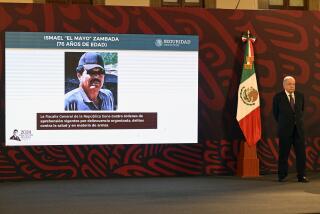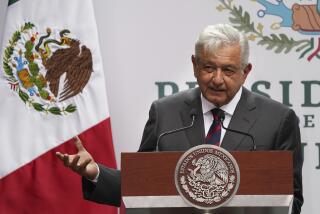CIA to Continue Probe of Crack Allegations
- Share via
WASHINGTON — The Central Intelligence Agency and several congressional committees will continue investigating reports that the CIA was involved in cocaine smuggling, despite a newspaper’s admission that many of its charges that sparked the inquiries could not be supported, officials said Monday.
The question of possible CIA involvement in the cocaine trade was reopened in Washington last year after the San Jose Mercury News alleged in a series of stories that the agency had protected two Nicaraguan drug traffickers in California. The newspaper said the two Nicaraguans deliberately introduced crack to black neighborhoods in Los Angeles and then sent millions of dollars in profits to the CIA-backed Nicaraguan rebels known as Contras.
On Sunday, the Mercury News said it had reinvestigated its own report and decided that its central assertions were not sufficiently proved.
Nevertheless, U.S. officials said Monday that their investigations would continue.
“The CIA’s independent, statutory inspector general is conducting a thorough review of the allegations raised by the San Jose Mercury News,” CIA spokesman Mark Mansfield said. “That review is still underway and should be completed by the end of the year.”
But Mansfield added: “That said, it is gratifying to see that a large segment of the media, including the San Jose Mercury News itself, has taken a serious and objective look at how this story was constructed and reported.”
Aides to the Senate and House committees on intelligence said they also would continue looking into the charges, although no hearings are scheduled. The aides said the congressional panels are waiting for the CIA to conclude its inquiry before conducting further hearings.
One reason the investigations will continue, officials said, is that their scope has widened beyond the specific allegations in the Mercury News.
Officials refused to say whether they have turned up any new evidence of CIA complicity in the cocaine trade.
In the past, the agency has acknowledged that some of the Nicaraguans it dealt with were involved in drug trafficking. But the CIA insisted that it never directed, condoned or protected any drug smuggling.
In a long article Sunday, the editor of the Mercury News, Jerry Ceppos, wrote that the newspaper had wrongly implied that the CIA knew about the Nicaraguans’ cocaine operations and protected them.
“Although members of the drug ring met with Contra leaders paid by the CIA and [reporter Gary] Webb believes the relationship with the CIA was a tight one, I feel that we did not have proof that top CIA officials knew of the relationship,” he wrote. “I believe that part of our contract with readers is to be as clear about what we don’t know as what we do know.
“We also did not include CIA comment about our findings, and I think we should have.”
Ceppos also wrote that the “clear implication of our series” that the Nicaraguans’ drug trafficking “played the critical role in the crack explosion in urban America” was an “oversimplification.”
Ceppos added: “I believe that we fell short at every step of our process--in the writing, editing and production of our work. Several people here share that burden,” he wrote. “We have learned from the experience and even are changing the way we handle major investigations.”
More to Read
Sign up for Essential California
The most important California stories and recommendations in your inbox every morning.
You may occasionally receive promotional content from the Los Angeles Times.










